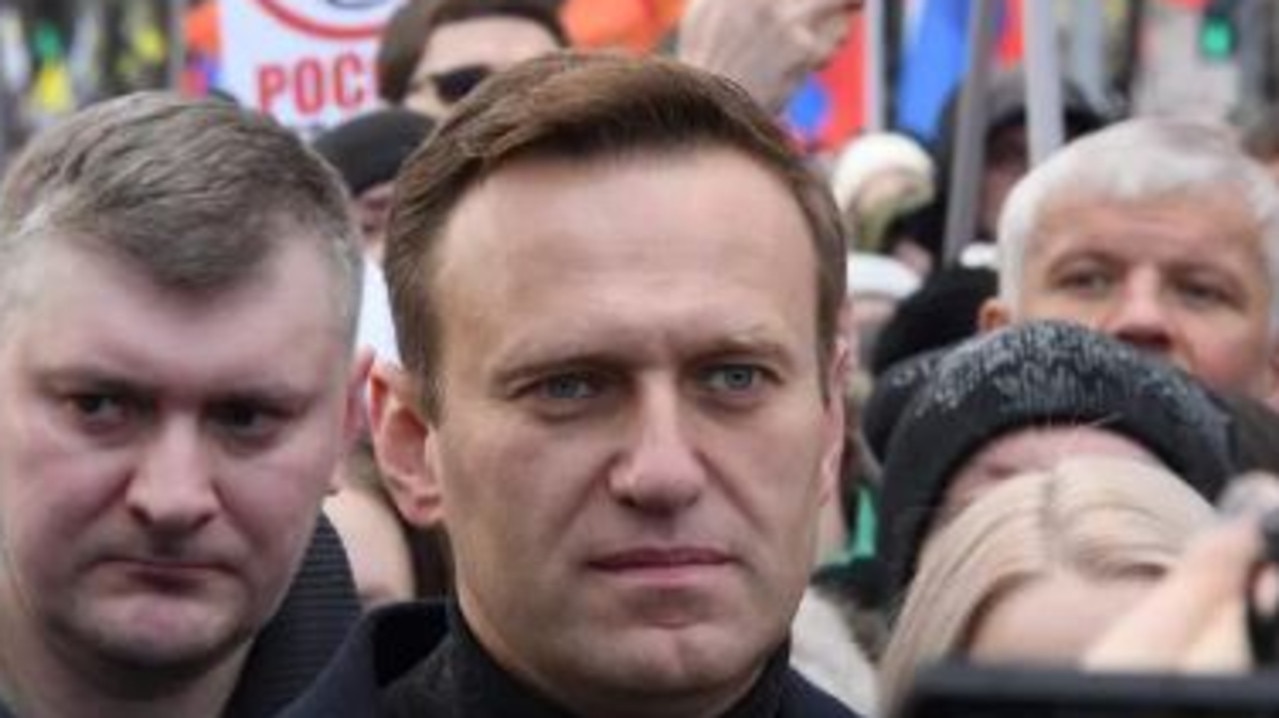Alexei Navalny poisoned by Novichok nerve agent, German government says
Vladimir Putin’s opponent Alexei Navalny has been poisoned with Novichok nerve agent, the German government said, urging Russia to explain.

Vladimir Putin’s main political opponent Alexei Navalny has been poisoned with Novichok nerve agent, the German government says.
Chancellor Angela Merkel’s spokesman Steffen Seibert released a statement on Wednesday claiming tests carried out on the Russian opposition leader provide “unequivocal proof” that he was poisoned by a chemical nerve agent.
“It is a shocking event that Alexei Navalny has become the victim of an attack with a chemical nerve agent in Russia,” the statement read.
RELATED: Tests reveal Putin opponent poisoning

Novichok was the same nerve agent used on Russian ex-spy Sergei Skripal and his daughter Yulia, who were attacked in the city of Salisbury, UK in 2018. The pair survived, however another woman, Dawn Sturgess, died from the chemical.
Russia has since denied any role in the Skripal incident and now Mr Navalny’s predicament.
However, tests carried out by the German army in consultation with the Charite hospital in Berlin, where Mr Navalny is being treated, had found evidence of the agent, the German government’s statement read.
The 44-year-old critic of Putin and anti-corruption campaigner was brought to the German capital on August 25 after falling ill in Siberia, where he has since been in a coma.
His team say he was poisoned on the orders of President Vladimir Putin. The Kremlin has dismissed the allegation.
The German government said it condemned the attack in the strongest terms, as Chancellor Merkel meets with senior ministers to discuss next steps.
“This has given rise to some very serious questions that only Russia can and must answer,” Merkel said.
Erklärung der Bundesregierung im Fall #Nawalny. https://t.co/QzFIgdnLUs pic.twitter.com/ZBTLlJo4M4
— Steffen Seibert (@RegSprecher) September 2, 2020
“It is a shocking event that Alexei Navalny was the victim of a chemical nerve agent in Russia. It has been strongly condemned by the Federal government,” the statement read, adding that it urges the Russian Government to provide an explanation on the matter.
The Kremlin said it had not received any information from Germany that Mr Navalny had been poisoned using a Novichok nerve agent, Russia’s Tass news agency reported.
RELATED: Putin rival critical after poisoning


The German government said it would inform the EU and NATO of its findings and that Mr Navalny’s wife Yulia Navalnaya and Russia’s ambassador to Germany would also be informed of the results.
“It will discuss an appropriate joint reaction with the partners in the light of the Russian agreement,” the statement read.
“The Federal Government will also contact the Organisation for the Prohibition of Chemical Weapons (OVCW).
“We hope for a full recovery of Alexei Navalny,” the statement concluded.
🇬🇧1/3 Alexei #Navalny has been receiving treatment at #charitéberlin since last weekend. His condition is stable. There has been some improvement in the symptoms caused by the inhibition of cholinesterase activity. ...
— Charité - Universitätsmedizin Berlin (@ChariteBerlin) August 28, 2020
The prominent Russian opposition figure was rushed into intensive care in Siberia last month after his plane made an emergency landing in the city of Omsk.
Mr Navalny’s supporters have said they believe he was poisoned by something in his cup of tea at the airport before he took off, pointing the finger of blame at President Putin.
The Omsk regional health ministry has said that caffeine and alcohol were found in Navalny’s urine, but “no convulsive or synthetic poisons were detected” at the time.
“The suspicion is … that somebody seriously poisoned Mr Navalny which, unfortunately, there are some examples of in recent Russian history, so the world takes this suspicion very seriously,” Seibert said.
ИÑчерпывающий ответ Ð”Ð¼Ð¸Ñ‚Ñ€Ð¸Ñ ÐŸÐµÑкова.
— Кира Ярмыш (@Kira_Yarmysh) September 2, 2020
ПреÑÑ-релиз немецкого правительÑтва может прочитать любой человек на земле, но Кремль - Ñамое недоÑтупное меÑто на земле, ни один звук, ни одна буква не может пробитьÑÑ Ñквозь Ñтот мощный заÑлон pic.twitter.com/rYWurWh6Tl
Jaka Bizilj, head of the Cinema for Peace NGO, told Germany’s Bild newspaper he believed Mr Navalny would survive but “the crucial question is whether he will survive this unscathed and continue to play his role”.
In any case, he would certainly be out of action politically “for at least one or two months”, Bizilj said, meaning he would miss key regional elections next month.
Spokesperson Manuela Zingl from renowned Charité hospital said his condition is not currently life-threatening.
Mr Navalny lost consciousness shortly after his plane took off from Siberia, where he was working to support opposition candidates ahead of next month’s elections.
He is the latest in a long line of Kremlin critics who have fallen seriously ill or died in apparent poisonings.
WHAT IS NOVICHOK ‘NEWCOMER’?
It is a group of military-grade nerve agents developed by the Soviet Union in the 1970s and 1980s — some variants of Novichok are thought to be five to eight times more toxic than the VX nerve agent, according to Professor Gary Stephens, a pharmacology expert at the University of Reading.
Novichok’s existence was revealed by chemist Dr Vil Mirzayanov in the 1990s, via Russian media. He later defected to the US, where he published the chemical formula in his book, State Secrets, the BBC reports.



